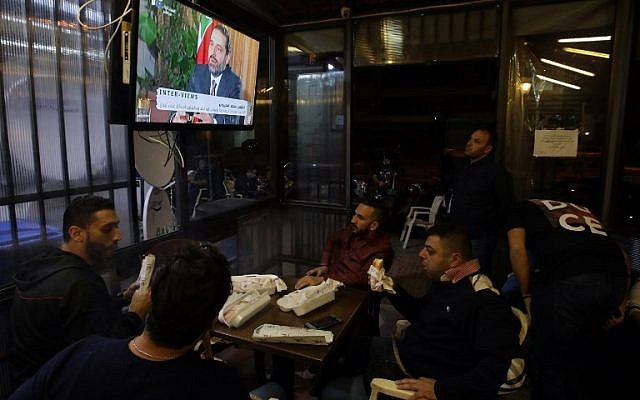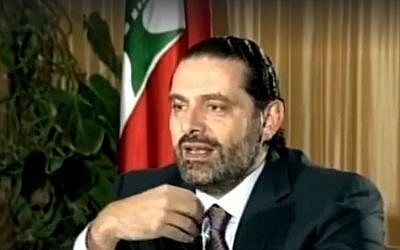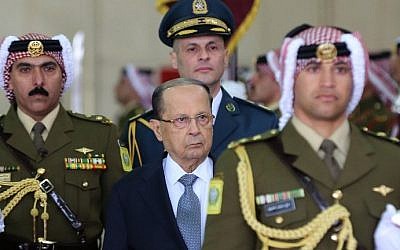In first interview since stepping down, Saad Hariri attacks Iran, says he could reclaim post if Hezbollah agrees to become neutral

Saad Hariri pledged on Sunday he would return to Lebanon from Saudi Arabia “very soon,” in his first television interview since his shock resignation as Lebanese prime minister eight days ago.
In an exclusive interview from Riyadh with his party’s Future TV, Hariri brushed aside rumors that he was under de facto house arrest in Saudi Arabia and hinted he could rescind his resignation if Hezbollah stopped getting involved in other conflicts outside of Lebanon.
“I am free here. If I want to travel tomorrow, I will,” Hariri told journalist Paula Yaacoubian.
“I will return to Lebanon very soon to initiate the necessary constitutional procedures,” Hariri said, adding later that he would land in Beirut “in two or three days.”
“Yes, it would have been better that I come to Lebanon (to resign) but there was danger,” he said, referring to an alleged assassination plot against him.
“I wrote (my resignation) with my own hand,” he said, rebuffing claims that he was being forced into resigning by Riyadh.
Wearing a suit and tie and with a Lebanese flag in the background, Hariri looked tired and spoke softly but firmly throughout the interview.
Hariri, who also holds Saudi citizenship, stepped down in a televised broadcast from Riyadh on November 4, a move that sent shockwaves throughout Lebanon and the region as tensions rise between Riyadh and Tehran, which back opposing sides in power struggles from Lebanon and Syria to Yemen.
He said his resignation was designed to “cause a positive shock” in the country, warning against Iranian interference that is, he said, ruining relations with other Arab countries.
Hariri said he “can’t be the only one making concessions while the others do whatever they want.”
Hariri said Saudi Arabia wants Lebanon to stay clear of regional conflicts, and not to side with Iran.
“We cannot continue in Lebanon in a situation where Iran interferes in all Arab countries, and that there’s a political faction that interferes alongside it,” he repeated on Sunday in apparent reference to rival movement Hezbollah.
“Maybe there’s a regional conflict between Arab countries and Iran. We’re a small country. Why put ourselves in the middle?”

He said withdrawing his resignation is conditional on Hezbollah, an Iranian proxy considered a terror group by Israel, committing to remaining neutral on regional conflicts. Hezbollah has sent thousands of fighters to Syria, Lebanon’s neighbor, to support the forces of Syria’s President Bashar Assad. He also seemed to indicate he did not support Hezbollah becoming involved in a conflict against Israel.
Hariri said the unity government he formed a year ago was supposed to stick to an agreement not to interfere in regional affairs. He said Hezbollah has not kept up its end of the deal.
“We are in the eye of the storm,” he said.
In his announcement last week, Hariri accused Iran and Hezbollah of taking over his country and destabilizing the broader region, saying he feared for his life.
Hezbollah chief Hassan Nasrallah said on Friday that Hariri was “detained in Saudi Arabia” and “banned from returning to Lebanon.” He also accused Saudi Arabia and Israel of masterminding the Lebanese political crisis.
Hariri said the unity government he formed a year ago was supposed to stick to an agreement not to interfere in regional affairs. He said Hezbollah has not kept up its end of the deal.
“We are in the eye of the storm,” he said.
In his announcement last week, Hariri accused Iran and Hezbollah of taking over his country and destabilizing the broader region, saying he feared for his life.
Hezbollah chief Hassan Nasrallah said on Friday that Hariri was “detained in Saudi Arabia” and “banned from returning to Lebanon.” He also accused Saudi Arabia and Israel of masterminding the Lebanese political crisis.
Lebanese President Michel Aoun has yet to formally accept Hariri’s resignation and has said he wants to meet him in person to discuss the situation.

Just hours before Hariri’s interview on Sunday, Aoun blasted the “obscure circumstances” around the resigned prime minister’s stay in Riyadh.
In a statement from his office, Aoun said “Hariri’s freedom has been restricted and conditions have been imposed regarding his residence and the contacts he may have, even with members of his family.”
In his interview on Sunday, Hariri said he has “excellent” ties with Crown Prince Mohammed bin Salman.
“Really, I consider him a brother and he considers me a brother. It’s an excellent and special relationship,” he said.
But he refused to comment on the internal political turmoil in Saudi Arabia, where dozens of high-profile politicians and businessmen have been arrested in what authorities say is an anti-graft drive.
As reported by The Times of Israel
